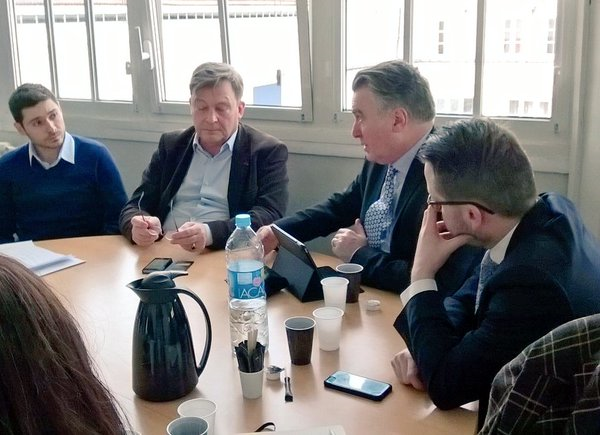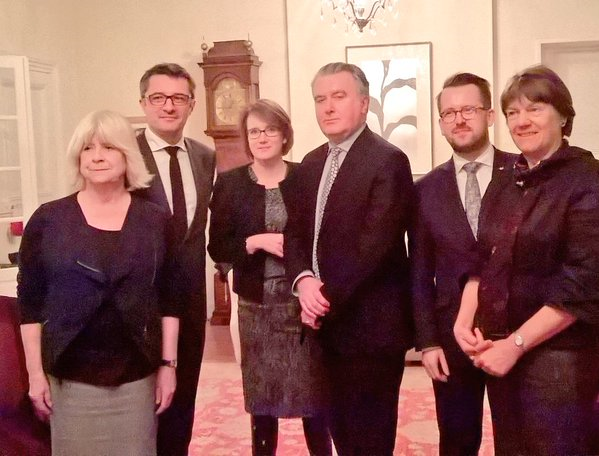

Exchanges in France on EU referendum and migration
This inter-parliamentary visit to our close neighbour was planned in the wake of the Paris terrorist attacks to demonstrate solidarity and to discuss specific mutual concerns such as addressing radicalisation and security challenges. However the decision subsequently taken to hold the UK referendum in June 2016 and events in Calais in particular, and the refugee situation in general, meant that these two items dominated our agenda. The previous week, Prime Minister Cameron and President Hollande had held the summit at Amiens which created a good background for our couple of days of exchanges.
In addition to myself as leader, the cross-party bicameral delegation consisted of Baroness Janke (LD), John Nicolson MP (SNP) and Stewart McDonald MP (SNP) with support from Sarah Crandall of BGIPU. We began with a briefing from the UK Ambassador in Paris, Sir Julian King. He himself had only been in post a short time and we appreciated his organising a reception with leading figures including the President of the Franco British Chamber of Commerce and the President of the Franco British Council. It became clear at this reception where the agenda for our two days would lie with significant interest on the issue of the UK’s planned EU referendum.
In terms of our programme, we divided our time between the National Assembly and the Senate. The meeting with members of National Assembly Foreign Affairs Committee chaired by Mme Elisabeth Guigou was an especially forensic examination of what the plans in the UK were for persuading voters to vote to remain in the UK, what the polls were saying, what plans had been laid in case of a Brexit etc. There was quite a lot of interest in the Scottish position and what would happen if the UK voted for leaving the EU. The meeting with the Board of the European Affairs Committee was also very interesting. It was evident in both cases how much interaction at committee level is appreciated and the Lords European Committee chaired by Lord Boswell of Aynho was regarded as an especially important link on both a formal and informal level. We also touched on military cooperation and the current issue around EDF and Hinkley Point.
We also met with Terre d’Asile, a large non-profit organisation working with immigrants in general and the migrants in Calais. They expressed frustration at the UK’s lack of progress on the issue and felt that beyond some financial commitment we were leaving the problem to the French. This view also surfaced amongst parliamentarians. There was little to no knowledge that UK NGOs and individuals were committed to working in Calais and now Dunkirk. The meetings with the UK Friendship Group concentrated more on the economic effects of the UK voting to leave the EU and posed many questions to which there will be no answer until after June 23.
We also visited the museum of Immigration which had a very thought provoking exhibition about Frontiers. It looked at their history from the Great Wall of China through to modern examples such as in Israel and Mexico. The museum has an ambitious outreach programme and also hosts 2000 teachers a year, besides school visits, to develop a dialogue and understanding of this most pressing current subject.
Besides our meetings with committees, individuals etc we had a visit to both chambers and a resume of French democracy from 1789 onwards. Apart from the outstanding opulence of the Palais de Luxembourg both seemed quite ‘home away from home’ though the Senators benefit from individual marked places unlike the Lords. Especially striking was the fact that there were two sizes of seat ‘normal’ and ‘large’! Our benches, though overcrowded, are less “size-ist”.
Overall it was a very interesting visit and showed that BGIPU’s involvement with our European neighbours, especially France with whose we cooperate bilaterally on several fronts such as military, security and culture, is well worth developing in terms of ensuring a general dialogue between parliamentarians beyond the more specialised relationships which already exist between counterpart committees in both legislatures.













